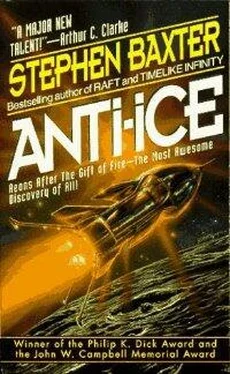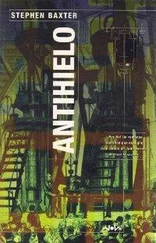Stephen Baxter - Anti-Ice
Здесь есть возможность читать онлайн «Stephen Baxter - Anti-Ice» весь текст электронной книги совершенно бесплатно (целиком полную версию без сокращений). В некоторых случаях можно слушать аудио, скачать через торрент в формате fb2 и присутствует краткое содержание. Год выпуска: 1993, ISBN: 1993, Издательство: Collins, Жанр: Фантастика и фэнтези, на английском языке. Описание произведения, (предисловие) а так же отзывы посетителей доступны на портале библиотеки ЛибКат.
- Название:Anti-Ice
- Автор:
- Издательство:Collins
- Жанр:
- Год:1993
- ISBN:978-0-246-13835-4
- Рейтинг книги:5 / 5. Голосов: 1
-
Избранное:Добавить в избранное
- Отзывы:
-
Ваша оценка:
- 100
- 1
- 2
- 3
- 4
- 5
Anti-Ice: краткое содержание, описание и аннотация
Предлагаем к чтению аннотацию, описание, краткое содержание или предисловие (зависит от того, что написал сам автор книги «Anti-Ice»). Если вы не нашли необходимую информацию о книге — напишите в комментариях, мы постараемся отыскать её.
Anti-Ice — читать онлайн бесплатно полную книгу (весь текст) целиком
Ниже представлен текст книги, разбитый по страницам. Система сохранения места последней прочитанной страницы, позволяет с удобством читать онлайн бесплатно книгу «Anti-Ice», без необходимости каждый раз заново искать на чём Вы остановились. Поставьте закладку, и сможете в любой момент перейти на страницу, на которой закончили чтение.
Интервал:
Закладка:
I stared up at that lovely island of water and cloud, and at the fizzing spark of the Little Moon which soared over the oceans; and, though I knew that we had many days of travel through space still to endure, every moment that passed would bring me closer to my home, and to the world of human affairs from which I had been plucked: to the world of war—and of love.
I stared at the planet until it seemed to me that the glimmering ocean was overlaid with the soft eyes of Françoise, my beacon of hope.
12
THE AIR OF ENGLAND
Josiah Traveller brought the Phaeton back to England on 20 September 1870.
The engineer jockeyed his battered craft through the fires of air friction, the globe-circling winds of the upper atmosphere, and finally a quite devastating thunderstorm: still a mile from the ground we cowered in our seats, peering fearfully through the ports at swords of lightning which leapt from cloud to cloud; and we imagined that we had passed through Earth all the way to Hell.
And at last the Phaeton, having all but exhausted its precious lunar water, settled with a bump into the soft, stubble-covered soil of a Kent farm. The rockets died for the last time, and silence settled over the Smoking Cabin which had become our prison. Pocket, Holden and I stared at each other with wild anticipation. Then we heard the soft sigh of the air of England against the outer skin of the craft; and we let out yells as we realized that we were at last home.
The Frenchman, Bourne, wept softly into the palm of his hand. I noticed this and, drawn by an odd sympathy I had acquired for the fellow, might have said some words to give him comfort. But my blood was racing at the thought that I had returned to my home country; a return that had seemed inconceivable through most of our astounding flight beyond the atmosphere. And so I pushed aside my restraints, still yelling like a coot, and stood up—
—and was floored, as fast as by any brawler’s haymaker, by my own astonishing weight!
My legs had crumpled like paper, and I found my face pressed uncomfortably against the deck. With arms which trembled from the strain I pushed myself upright and rested my back against the padded wall. “My word, fellows, this gravity has given us all a pack to wear.”
Holden nodded. “Traveller did warn us of the debilitating consequences of a lack of weight.”
“Yes; and so much for all his wretched exercise regimes. To the Moon with a set of Indian clubs! Well, I’d like to see how the great man himself is bearing up under this once-familiar strain…” But Holden shamed me with his reminder that Traveller was an old man who should not be encouraged to strain his heart. And so it was I who crawled like a weakened child to the large hatchway set in the wall of the Cabin.
After much effort I succeeded in turning the locking wheel, and I kicked open the heavy hatch.
A draft of cool air, the essence of a fresh English autumn afternoon, gushed into the craft. I heard Holden and Pocket sigh over the crisp oxygen, and even Bourne looked up from his introverted weeping. I lay on my back and sucked in that wonderful atmosphere, and felt the blood course through my cheeks at the nip of cold. “How stale the air was in this ship!” I said.
Holden breathed deeply, coughing. “Traveller’s chemical system is a scientific marvel. But I have to agree, Ned; the piped air in this box has become steadily more foul.”
Now I pushed myself upright and slithered forward until my legs were dangling over the ten-foot drop to the dark loam of Kent; I gazed out over fields, hedgerow, threads of smoke from farmhouse fires and copses.
I looked down, wondering how I might reach the ground—and found myself staring into the wide, ruddy face of a farmer. He wore a battered but respectable tweed suit, muddied Wellington boots and a straw hat; and he carried a large pitchfork, held before him as if for defense. As he gazed at our unlikely craft his mouth hung open, showing poor teeth.
I surreptitiously made sure my tie was straight and waved to him. “Good afternoon, sir.”
He stumbled back three paces, held up the pitchfork at me and his jaw dropped further.
I raised my hands and essayed my most diplomatic smile. “Sir, we are Englishmen; you need fear nothing, despite the extraordinary manner of our arrival.” It was time to be modest. “You have no doubt heard of us. I am of the party of Sir Josiah Traveller, and this is the Phaeton.”
I paused, expecting instant recognition—surely we had been the subject of press speculation since our disappearance—but the worthy rustic merely scowled and uttered a syllable I interpreted as: “Who?”
I began to explain, but my words sounded fantastic even to my own ears, and the farmer merely frowned with ever greater suspicion. So at last I gave it up. “Sir, let me emphasize the pertinent fact: which is that we are four Englishmen, and a French, in desperate need of your assistance. Despite my youth and health I cannot even support my own weight, thanks to the astounding experiences to which I have been subject. I therefore ask you, as one Christian to another, if you will forward the help we need.”
The farmer’s face, red as an apple, was a picture of mistrust. But at last, after muttering something about the acres of stubble we’d scorched to a crisp, he lowered his pitchfork and approached the vessel.
The farmer’s name was Clay Lubbock.
It took Lubbock and two of his strongest lads to carry us from the ship. They used slings of rope to lower us from one strong set of arms to another. Then we were loaded on to a bullock cart and, swathed in sheets, hauled off across the broken ground to the farmhouse. Traveller, his voice rendered uneven by the jolting of the cart, remarked on the irony of our rapid descent through the technological strata; but his own appearance—thin, fragile and deathly pale—belied his jocular words, and none of us responded.
The rustics stared in silent fascination at Traveller’s platinum nose.
In the farmhouse we were greeted by Mrs. Lubbock, a bluff, gray woman with massive, hair-coated forearms; without questions or how-do-you-do’s she assessed our condition with the ready eye of a buyer of livestock and despite some protests from Traveller, soon had us wrapped up warmly before a roaring fire and was pouring thick chicken stock into us. Lubbock, meanwhile, set off to town on his fastest horse to spread the word of our return.
Traveller chafed at his confinement, protesting that he was no invalid and that there was work to be done. He was anxious to get to a telegraph station so that the work of transporting the scarred Phaeton to his home in Surrey could begin. Holden calmed him. “I, too, am anxious to return to civilization,” he said. “Remember I am a journalist. My paper, and others, should reward me well if I turn our jaunt into a well-turned narrative. But, Sir Josiah, I recognize my own frailty. As soon as word spreads of our return the world will surely descend on us. I have been through an ordeal without parallel in human history and am left barely capable of supporting a laden soup spoon, and would welcome the chance to recuperate for a few hours under the kind hospitality of Mrs. Lubbock. And so should you, Sir Josiah!”
Traveller did not accept the argument but had little choice but to comply; and so we were put to bed in hard pallets in small bedrooms scattered about the Lubbocks’ home. Holden persuaded the farmer to station one of his lads as a guard outside the room of the wretched Bourne; I thought this was rather sour, as Bourne was hardly in a condition to shin out of the window and race off to freedom across the fields.
I lay in my pallet waiting for sleep, with my window open to admit the bright autumn air, and reflected that, despite the discomforts of this world (the hardness of the mattress under my spine, for instance, was hardly helping my new induction into Earth’s gravity), the compensations—the scent of the trees growing just beyond my window, the distant rustle of a breeze through the hedgerow, the rough caress of the Lubbocks’ sheets against my face—made the thought of ever leaving this Earth again seem an abomination.
Читать дальшеИнтервал:
Закладка:
Похожие книги на «Anti-Ice»
Представляем Вашему вниманию похожие книги на «Anti-Ice» списком для выбора. Мы отобрали схожую по названию и смыслу литературу в надежде предоставить читателям больше вариантов отыскать новые, интересные, ещё непрочитанные произведения.
Обсуждение, отзывы о книге «Anti-Ice» и просто собственные мнения читателей. Оставьте ваши комментарии, напишите, что Вы думаете о произведении, его смысле или главных героях. Укажите что конкретно понравилось, а что нет, и почему Вы так считаете.












